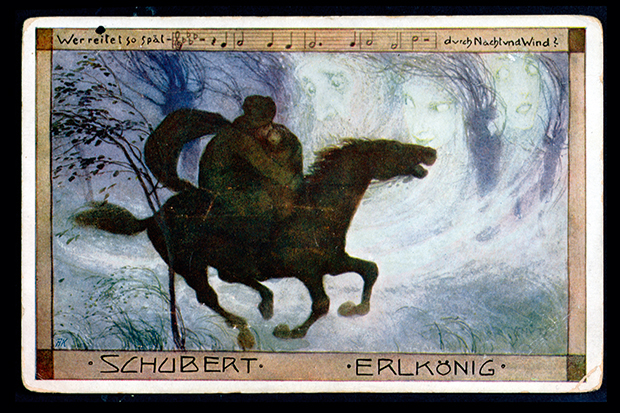There can be no good reason why Graham Johnson’s marvellous three-volume encyclopaedia of Schubert’s songs has been so neglected by reviewers over the past year. There are two possible bad ones: the price, which at £200 may deter the faint-hearted (though at nearly 3,000 pages it would justify twice the outlay); and the fact that its publication coincided with Ian Bostridge’s Schubert’s Winter Journey. Perhaps literary editors thought one Schubert book enough.
It’s time to put this right. Spectator readers don’t need to be persuaded of the appeal of Schubert’s Lieder, and this is the book on the subject — the best written, longest and most informative. The product of a lifetime’s work, it will also be a lifelong companion. Emerging from the accompanying notes to the Hyperion complete Schubert song CD series, it provides not only a commentary on each of the 650-odd songs, but also wide-ranging essays on a variety of subjects — including contemporary poets and the composer’s friends — placed in their cultural and historical context, together with excellent illustrations. It really is the definitive treatment of the German-speaking world at its musical and literary apogee.
The closest anything else has come to such an undertaking was John Reed’s 1985 Schubert Song Companion, which also provided a (more concise) treatment of each song. But Johnson’s learning is of a different order. He knows the songs from the inside — or, rather, from the bottom up. Those who listen to music from the top down, seduced by the first violin while ignoring what lies beneath, miss most of the point. Johnson helps one understand what’s happening in the engine room, as it were.
Here he explains just why a certain song’s melody and harmony can feel so heartbreaking, as he compares Die Taubenpost (The Carrier Pigeon), the last of the solo songs, with the earlier Frühlingsglaube (Faith in Spring):
The determination to believe that a milder spring is just around the corner is admirable, but the music tells us that this optimism is misplaced. The combination of self-delusion and gentle rapture engenders our compassion. Similarly, the lover, too shy to woo with word and gesture, who sends forth his affection day after day in the form of mute and fluttering longing, is someone whose constancy we can admire, but only with tender concern for his real happiness. Like the nightingale in Wilde’s fairy story, there are those who press their hearts to the rose-thorn and sing with exultant happiness, and Schubert is one of them.
We might imagine that here is unalloyed joy until we read, or listen, between the lines. And then we are almost embarrassed to feel pity, so dignified and self-sufficient seem the bright-eyed singers of both songs. We know something they do not: that spring will never arrive, and that one day soon the pigeon will fade away on its homeward journey. How we know this is another Schubertian mystery, but we do, and it is somehow audible in the music. Thus Schubert seems to engage our pity without asking for it; and the radiance of the music draws us even closer to the hidden suffering.
Johnson shares his wisdom in wonderfully diverse ways. He may lead one to reassess a song that others have dismissed, such as the strophic setting of Goethe’s erotic-exotic ballad Der Gott und die Bajadere (The God and the Dancing Girl). Or his means can be purely musical. In Der Winterabend (The Winter Evening), an extended song about an old codger contemplating his past life with a sort of melancholy contentment, we may have the sense, towards the end, that something special happens as he calls to mind his long-dead wife. But we need Johnson to explain how it’s done:
She makes her reappearance not in some distant tonality but in the home key, her presence signified by a glorious counter-melody in the piano, which serves as a descant to our song’s by now familiar vocal theme. This passionate combination transfigures what we are now made to realise has only been half of the whole, half of the music for a story of shared lives; as the husband’s theme joins the wife’s, we briefly hear the complete story. The memory of happiness prompts a brief moment of exaltation, for there is life in the old boy yet.
Or again, Johnson may put his literary imagination to a song’s service: in Der Doppelgänger, he refreshes the implacable encounter of the rejected lover and his ghost-double with an unexpected quotation from Hardy’s equally horrifying Titanic poem, ‘The Convergence of the Twain’. After insights and connections like these, things are never the same.
If Neville Cardus had reviewed this encyclopaedia, he might have called it the Wisden of Schubert Lieder. But not even that indispensable almanack could ever provide the quality of prose, depth and sheer companionship that this book offers.
Got something to add? Join the discussion and comment below.
Get 10 issues for just $10
Subscribe to The Spectator Australia today for the next 10 magazine issues, plus full online access, for just $10.
Available from the Spectator Bookshop, £170, Tel: 08430 600033
You might disagree with half of it, but you’ll enjoy reading all of it. Try your first month for free, then just $2 a week for the remainder of your first year.














Comments
Don't miss out
Join the conversation with other Spectator Australia readers. Subscribe to leave a comment.
SUBSCRIBEAlready a subscriber? Log in